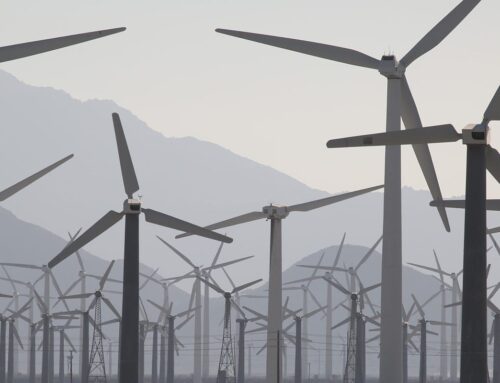1st Friday Focus on the Environment: A look at EPA accountability and compliance gains in advance of a second Trump administration
January 3, 2025
ABOUT DAVID UHLMANN:
David M. Uhlmann is the Assistant Administrator for EPA’s Office of Enforcement and Compliance Assurance (OECA). He previously served from September 2022 to July 2023 as Senior Advisor to the EPA Administrator and as Deputy Assistant Administrator for OECA.
Before joining EPA, Uhlmann was the Jeffrey F. Liss Professor from Practice and the inaugural Director of the Environmental Law and Policy Program at the University of Michigan Law School from 2007 to 2022. During that time, Uhlmann also served as the Counselor to the Independent Monitor and Auditor appointed by the Justice Department and EPA after the Volkswagen diesel scandal. His research and advocacy interests include criminal and civil enforcement of the environmental laws, corporate accountability, and climate change and sustainability.
Uhlmann served from 1990 to 2007 at the U.S. Department of Justice, the last seven years as chief of the Environmental Crimes Section, where he was the top environmental crimes prosecutor in the country. He led an office of approximately 40 prosecutors responsible for the prosecution of environmental and wildlife crimes nationwide and chaired the Justice Department’s Environmental Crimes Policy Committee. His work as lead prosecutor in United States v. Elias, a knowing endangerment case that left a 20-year-old worker severely and permanently brain-damaged, is chronicled in The Cyanide Canary. He received numerous Justice Department and EPA awards for his precedent-setting prosecutions, including the first environmental justice criminal trial.
Uhlmann is a fellow in the American College of Environmental Lawyers and was named a “Conservation Hero” by the Michigan League of Conservation Voters. He received his J.D. from Yale Law School and a B.A. in history and political science with high honors from Swarthmore College. Following law school, he clerked for United States District Court Judge Marvin H. Shoob in Atlanta, Georgia.
Uhlmann is married to Virginia Murphy, a professor in the Residential College at the University of Michigan. They have three adult children and two grandchildren, all of whom love the beaches of Lake Michigan and hiking in the northern Maine woods.
ABOUT LISA WOZNIAK:

Michigan League of Conservation Voters
/
michiganlcv.org
Lisa’s career spans over two decades of environmental and conservation advocacy in the political arena. She is a nationally- recognized expert in non-profit growth and management and a leader in Great Lakes protections. Lisa is a three-time graduate from the University of Michigan, with a bachelor’s degree and two ensuing master’s degrees in social work and Education.
Lisa serves a co-host and content partner in 89.1 WEMU’s ‘1st Friday Focus on the Environment.’
RESOURCES:
Michigan League of Conservation Voters
Environmental Protection Agency
TRANSCRIPTION:
David Fair: This is 89 one WEMU. And welcome to the January edition of WEMU’s First Friday Focus on the Environment. Happy New Year’s, everybody! I’m David Fair, and we enter a new year with a lot of questions, a list of concerns and some quiet optimism when it comes to the health of our air, land and waters. My partner on First Fridays is Lisa Wozniak. She serves as executive director of the Michigan League of Conservation Voters. And it’s always good to have you here, Lisa! And a Happy New Year to you!
Lisa Wozniak: Well, Happy New Year to you, too. David! It’s great to kick off 2025 with a new edition of First Friday Focus on the Environment. And I believe we have the perfect guest as we begin anew and look at the year ahead. David Uhlmann, a former professor of law at the University of Michigan, serves as assistant administrator for the Environmental Protection Agency’s Office of Enforcement and Compliance Assurance. David, welcome back to WEMU and Happy New Year!
David Uhlmann: Thank you, Lisa! Happy New Year to you as well! Thanks for having me on the show!
Lisa Wozniak: Absolutely! It’s been about a year-and-a-half since you were sworn in as the assistant administrator for the EPA’s Office of Enforcement and Compliance Assurance, which I often think of to myself as the agency’s top cop. And you’ve entered this job with a lot of ideas and a pretty bold vision. Is it what you hoped for and expected at this point?
David Uhlmann: Well, thanks for the question, Lisa. And I came into this position with two main goals. One was pivoting the enforcement program at EPA, which is about 2800 people nationwide to focus on what I refer to as 21st century environmental challenges: issues like climate change, promoting environmental justice, addressing PFAS contamination. Those are the kinds of issues that EPA needs to be focusing on that make a huge difference to communities all across America and help promote a sustainable future for our children and grandchildren. The other issue that I wanted to focus on was revitalizing EPA’s enforcement program. And this is a critically important area because the EPA, in the enforcement area, had lost about a third of its positions starting in 2011 when Barack Obama was president and accelerating during the first Trump administration. So, getting the EPA back to a place where it had the kind of capacity it needs to protect communities from harmful pollution was also a top goal of mine. And we’ve made great progress on both fronts.
David Fair: As you have noted, enforcement efforts have increased. It has resulted in more fines for polluters and more polluters being held accountable. Is this the start, or is this the be all end all where we are today?
David Uhlmann: Well, it shouldn’t be the be all end all, David. We’re in a really good place. We just finished….in government, we talk about fiscal years, which is October 1st to September 30th. So, fiscal year 2024 is the year that we just finished. And it was the best year for the EPA enforcement program since 2017. Even though we had a lot fewer people in 2024 than we had back in 2017, we did more inspections at facilities across America. We brought more civil cases against polluters. We opened more criminal investigations, actually more criminal investigations, than any time since 2015. We brought bigger cases producing record fines because Clean Air Act, mobile source and stationary source cases we’ve ever brought. We concluded the Norfolk Southern case in East Palestine. So, the enforcement program is strong. Obviously, what will happen going forward is going to depend on whether the incoming administration upholds the commitment we’ve made to protecting communities across America from harmful pollution. But let me be very clear. The enforcement from the EPA is poised for even greater gains in 2025 and 2026 and beyond because of what we’ve done over the last two-plus years to revitalize EPA enforcement.
David Fair: This is the inaugural First Friday Focus on the Environment of 2025 on 89 one WEMU. We’re talking with David Uhlmann from the Environmental Protection Agency. And, David, when it comes to that enforcement and accountability, how difficult is it for you at the federal level to navigate the various laws and political positioning that occur state to state?
David Uhlmann: Well, states are essential partners in everything we do in the enforcement space. They’re on the front lines. They’re the ones writing permits. They’re the ones who do a lot of the inspections and a lot of the enforcement activity. But the good news is the federal environmental laws apply with equal force in all 50 states. One of the things that we do at EPA, first and foremost is support state efforts to hold polluters accountable and make sure that everybody living in the United States can breathe clean air and drink safe water. But if state efforts lag, EPA can step in and fill those gaps, so that whether you have the ability to breathe clean air or whether you have the ability to drink safe water doesn’t depend on what state you live in.
Lisa Wozniak: So, when we think about Michigan, I’d love to hear from you, maybe, an example of how you have been working specifically with Michigan’s Department of Environment, Great Lakes and Energy to enforce environmental laws and regulations.
David Uhlmann: Michigan EGLE, as it’s called, is a terrific organization, and there’s a lot of really great activity. Michigan’s a leader on addressing PFAS contamination. Michigan has a long tradition of doing everything possible to protect water quality and particularly our beloved Great Lakes. And Michigan’s been a leader in climate, addressing what is the most significant environmental challenge facing our nation and the world. So, Michigan’s a fabulous partner. And as we look into 2025 and a time where there is uncertainty about what the federal government’s going to be doing, I’m confident that Michigan will continue to provide great leadership.
David Fair: Once again, this is WEMU’s First Friday Focus on the Environment. And our first guest of 2025 is David Uhlmann from the EPA. The EPA is with full support and direction from the Biden administration has put an important emphasis on addressing pollution in communities that are overburdened by legacy pollution. Can you tell us a little bit about what that looks like in practice?
David Uhlmann: Yeah, I’m glad you asked about this, David, because, frankly, I think of this as a moral issue, not just a legal issue and not just an environmental issue. We have visited the worst pollution on already overburdened and marginalized communities, oftentimes communities of color, although not exclusively communities of color. And we have an obligation to do everything we can in those communities to make sure that they enjoy the same environmental benefits as everybody else living in the United States. That’s not a commitment we kept in our country. Bill Clinton, when he was president in 1994, signed the first executive order on what’s referred to as environmental justice, setting forth the principle that the federal government, in all its activities, would seek to protect communities that have suffered the worst pollution. But we’ve really struggled to meet that. What’s wonderful about the Biden administration in this space is that they made it a front line commitment. We have set goals for ourselves that EPA of doing more than 50% of our inspections and more than 50% of our enforcement work in overburdened and marginalized communities. And in each of the last two years, we’ve exceeded those goals. And that doesn’t mean our work is done, but it does mean we’re showing up and taking action in communities that, for too long, have been left out and left behind. And that’s work that needs to continue as we transition to a new administration.
Lisa Wozniak: Well, that leads me to the question about the change ahead. You’ve noted the progress they’ve made in your time at EPA and you have identified environmental challenges that lie ahead. But towards the end of this month, a new administration takes over. And there are always changes with turnover. President-elect Trump has nominated former New York Congressman Lee Zeldin to run the EPA. Do you and your colleagues expect a dramatic shift in focus and priorities and potentially rollbacks in the gains you’ve outlined here today?
David Uhlmann: Well, Lisa, elections have consequences, and it remains to be seen what the approach of the Trump administration will be–the second Trump administration will be. We do have a track record or they do have a track record. The first time Donald Trump was president of the United States, there were significant drops in enforcement activities. Polluters weren’t held accountable in the same ways that they had have been over the last two years. But my hope going forward is that the new team will do what both Democratic and Republican administrations have done over the course of the last 50-plus years that EPA has been in existence, and that is uphold the rule of law, continue to hold polluters accountable based on the law and the facts and the obligation that EPA has to protect communities from harmful pollution. And frankly, there shouldn’t be anything partisan about that. I talked earlier about the fact that everyone living in the United States should be able to breathe clean air and drink safe water, and that’s not a partisan idea. I referred to it as a moral principle, and that’s a moral principle that EPA is dedicated and the career staff at EPA are committed to upholding regardless of who is president. And so, that’s what I think we should expect of the new administration, and we should hold them accountable if they don’t meet that commitment.
David Fair: Well, it’s going to be interesting to watch in the next four years. Thank you so much for the time today and the conversation, David! And a Happy New Year to you!
David Uhlmann: Happy New Year to you as well! And thank you again for giving me the opportunity to join your show!
David Fair: That is David Uhlmann, assistant administrator for the Environmental Protection Agency’s Office of Enforcement and Compliance Assurance, and our first guest of 2025 on EMU’s First Friday Focus on the Environment. And a thanks to you, Lisa! We’ll look forward to the February edition!
Lisa Wozniak: As always, I look forward to it, David! Thanks!
David Fair: That is Lisa Wozniak, the executive director of the Michigan League of Conservation Voters and my longtime partner on First Fridays. I’m David Fair, and this is your community NPR station, 89 one WEMU FM, Ypsilanti.
Non-commercial, fact based reporting is made possible by your financial support. Make your donation to WEMU today to keep your community NPR station thriving.
Like 89.1 WEMU on Facebook and follow us on Twitter
Contact WEMU News at 734.487.3363 or email us at studio@wemu.org
Search
RECENT PRESS RELEASES
Related Post




